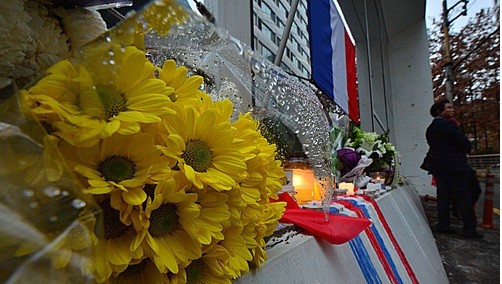
[Special Economy=Eunji Kim]The world is still reeling from the Paris terror attacks but there seems to be no extreme waves in the financial market.
For example, the French stock market index, CAC 40, rebounded just one day after the attacks, ending 2.77% higher on Tuesday and due to France deploying jets to ISIS sites in Syria, where there is oil supply, energy shares gained 3.3% on Monday, the most in the S&P 500.
CAC-40 can tumble, or not, in the coming days but that won't be mainly due to the attacks, and oil prices can simultaneously fall but there is a possibility it will continue to climb, with energy shares rising.
After Sept. 11, Brent crude price saw a 55 percent rally over 12 months, a surge that began in Nov. 2001.
"We have to keep observing the effects of the Paris terror attacks," said Lee Joo Yeol from The Bank of Korea. "But another problem is the prospect of the Federal Reserve raising the U.S. interest rate by December, a possibility that is very high. If the raised interest rate and the volatile Chinese market come together, that can bring swings to the international financial market."
What experts say is that this dilemma of raising the interest rate, or not, and its ultimate path will play a more heavy role, than the attacks, in impacting the world's economic situation.
If the interest rate is raised by at least 0.25%, it will attract more investors and increase consumer confidence. But for other countries, they will lose investors to the United States, receiving a bearish impact afterwards. And, 0.25% may not seem much, but it is a big percentage, considering the high amount of money that is invested.
This tactic by the United States, the world's second largest economy, will cause stock volatility at least for a while, as it did previously whenever the Chair of the Board of Governors of the Fed, Janet Yellen, made a statement about the following topic.
On the other hand, others say the effects may not be so hard-hitting, and because the move was known and broadcasted, in contrast to an unprecedented act, the global market has already felt the effects.
But, depending on how much more the board will continue to raise the interest rate after the initial hike, it can create some extra ripple, which is all the reasons to pay attention to this possible December rate hike and what it will bring.
With that said, however, this tragic event's aftermath can not be undermined. A country that attracts 80 million visitors, France has earnings from the tourism industry that take up 7.5% of its GDP. If this industry is hit by the attacks, the country's economic growth rate can fall, too. France's travel and leisure stocks finished 1.4 percent lower as a sector when the markets opened on Monday.
And, with French President, Francois Hollande, declaring, "France is at war," the country's military spending will rise, further bringing economic burden and raising debt levels.
Consider what happened to the United States after Sept. 11. U.S. government debt and deficits ballooned due to huge increases in military, defense and security spending. There was a lack of job creation and lack of consumer spending.
That, too, can happen in France; but, the effects will be short-lived and only temporary, according to a majority of experts.

